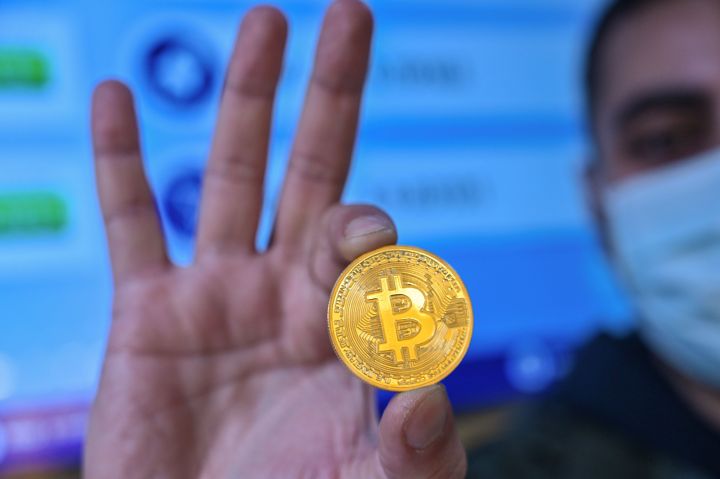
Why is Bitcoin better? Let her count the ways.

Bitcoin has surged over the last several months, thanks to Tesla adding $1.5 billion worth of bitcoin to its balance sheet and interest from asset managers like BlackRock. But last week, Treasury Secretary Janet Yellen issued a warning about the volatile cryptocurrency, saying it is “an extremely inefficient way of conducting transactions.”
“Marketplace” host Kai Ryssdal called Laura Shin, host of the video/audio series “Unchained” and one of the first reporters to cover crypto assets full time. She spoke with Ryssdal about what it’s like to cover Bitcoin right now, and why she’s so interested in the cryptocurrency. The following is an edited transcript of their conversation.
Kai Ryssdal: Is the theory behind Bitcoin then not ever that it’s going to be a usable currency? That I’m going to be able to walk down the street and buy a six pack of beer with it?
Laura Shin: Well, so there are different people with different theories. Famously, the first person to make a transaction that then put a value on a bitcoin spent 10,000 bitcoins on a couple pizzas, which is like hundreds of millions of dollars that he spent on those two pizzas if you use the price today. So, you know, at the moment where bitcoiners would say that we’re in an adoption phase, probably people aren’t going to be spending it in that way. However, they do envision a world where people are on a sort of Bitcoin standard, or it’s a world of what they call hyper-bitcoinization, and people transact in bitcoin and they think in bitcoin rather than thinking in dollars, and so instead of saying bitcoins trading at $44,000, or whatever it was, it’s just like one bitcoin is one bitcoin.
Ryssdal: Wow, I’m not sure how I can wrap my brain around that. Should we just stop paying attention to Bitcoin for a little while?
Shin: Well, when you say that, I don’t know what you mean or why you would ask that. Because to my mind, as a journalist covering this, this is the most interesting thing I’ve ever covered. I can’t imagine stopping. Paying attention to this is definitely the most fascinating thing I’ve ever watched.
Ryssdal: Say more about that. Because look, your enthusiasm is infectious and I get it, but it seems detached from everyday life in this economy.
Shin: So when you really understand the technology of Bitcoin, or any cryptocurrency, well, not any but, you know, some of the more legitimate ones, you realize, “Wow, this truly is a far superior form of money than any other money we’ve ever had purely on the technological level.”
Ryssdal: Why? Why is it better?
Shin: It’s more fungible, it’s more divisible, it’s more portable. It’s just more transparent. But certainly, when I learned about this technology, I just realized this is going to change everything. And I really think we’re going to look at huge disruptions in finance over the coming decade, which we’re starting to see the glimmers of.
Ryssdal: What is the good that comes from Bitcoin for the nonfinancial types for whom this is still a “holy cow, what is Bitcoin thing?” What’s the good that comes from this for a regular person in this economy right now, if any?
Shin: Well, I mean, literally, this moment, I’m not quite sure. But over time, these technologies would enable a lot more financial transactions to happen more cheaply. There’s a lot of remittance companies right now that charge something like 30% of a transaction, depending on which countries you’re sending the money to and from. You know, if they’re obscure enough countries, they will take a huge chunk. But if you’re going to send bitcoin from one obscure country to another, it’s the same fee for everybody. It’s not charging you, you know, separately for that. And there’s an opportunity for it to bank the unbanked. Because all you need is an ability to hold these digital coins. And clearly, obviously, there’s going to be a lot of education that will need to happen, because the one thing that unfortunately a lot of people have learned the hard way is that digital assets do not function like digital objects that we’re used to dealing with. And they do not function the way that the normal financial system does, where you can call the bank or credit card and ask them to reverse the transaction.
Ryssdal: Right. That’s the key part. That’s the point, right? And that’s the thing that’s gonna take some time for people to wrap their brains around. It’s just different, right?
Shin: Yes. It’s like cash. But digital.
There’s a lot happening in the world. Through it all, Marketplace is here for you.
You rely on Marketplace to break down the world’s events and tell you how it affects you in a fact-based, approachable way. We rely on your financial support to keep making that possible.
Your donation today powers the independent journalism that you rely on. For just $5/month, you can help sustain Marketplace so we can keep reporting on the things that matter to you.











